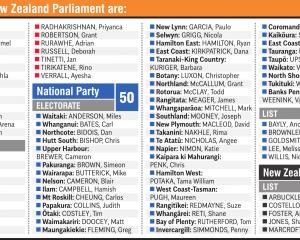
Election night results have National and Act with 61 seats together, but that could be reduced by one or two seats after special votes are counted, while the Port Waikato by-election in late November could result in a further overhang seat, meaning a 122-seat Parliament.
Westpac chief economist Kelly Eckhold said that would mean a National-led government needing New Zealand First support in some form, whether as a formal coalition partner or offering support for confidence and budgets.
"Our assumption is that the National Party's preference will be to tie both ACT and NZ First into a formal three-way coalition. We think that National will view this as a more stable government," Eckhold said.
"It's possible that NZ First will want, or be required, to play a more supporting role and that NZ First could sit outside the government and offer support for confidence and supply in return for policy concessions (and/or minor ministerial positions outside of cabinet)."
In any event, Eckhold doubted there could or would be any rapid policy moves by a new government, given the timetable for vote counting and then coalition talks.
"This may affect prospects for National to deliver the 'mini-budget' prior to Christmas that had been signalled during the campaign but the generally conciliatory tone among the three players means it could still be in play."
"This 'mini-budget' or Half Year Economic and Fiscal Update is likely to not be released before mid-December - meaning no new, fully costed government policy initiatives until then."
Tighter financial belt

"The key differences relate to the extent of spending cuts to be pursued - ACT and NZF generally favour greater cuts - and the extent to which revenue from National's proposed tax on homes bought by foreigners can be relied on to fund tax cuts."
"The bottom line is more spending cuts may need to be agreed to get the coalition across the line."
He said broader economic issues such as scrapping the Reserve Bank's mandate to maintain sustainable employment, the impact of spending cuts on RBNZ interest rate policy, or cutting regulations would take time to implement and have an effect.
Meanwhile, short-term financial market reaction was likely to be steady, with overseas events and a sharp rise in oil prices drawing more attention.
Eckhold said the New Zealand dollar might rise against other currencies briefly, as might some wholesale interest rates.
"Markets will mostly reserve judgement until the new government's mini-budget."
By Gyles Beckford










